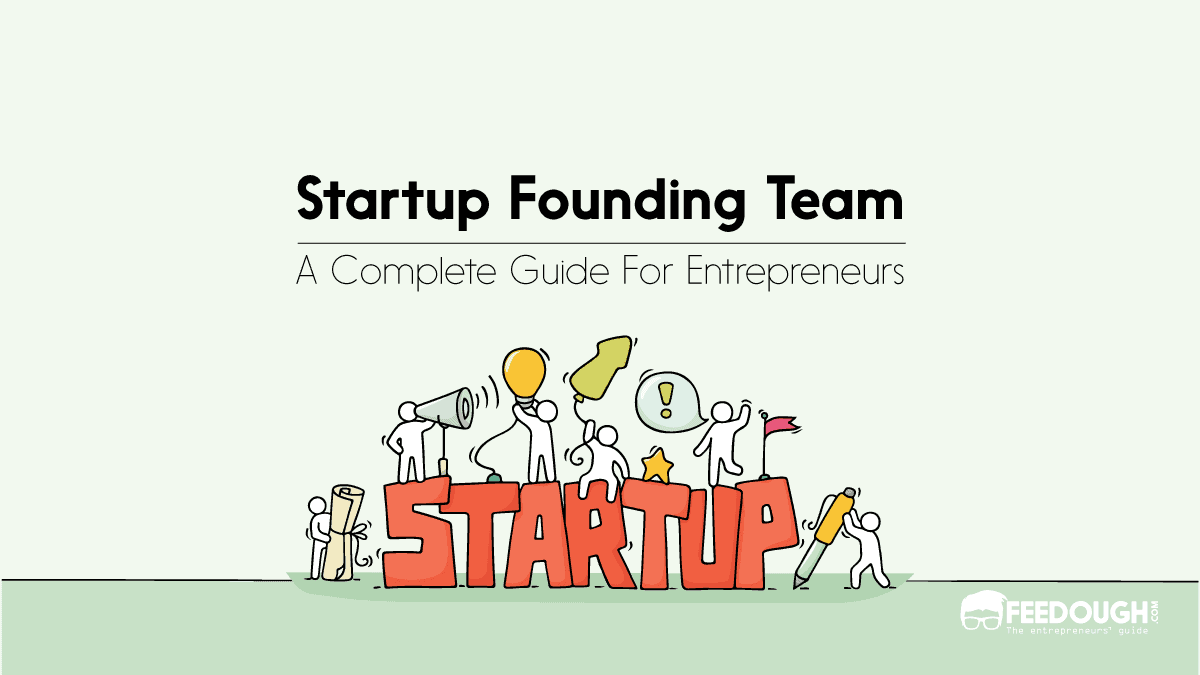Trust me when I say this – startups live and die by the people who make them up. A startup team is not just a group of people working together towards a common goal, but a close-knit family that has each other’s backs through the good and the bad times.
In fact, according to several venture capitalists, 65% of startups fail because of people and team problems (not product or market).
So if you’re a startup founder, it’s critical that you take the time to build a strong founding team of cofounders and early employees. But how do you go about doing that?
Or even more importantly, how do you make sure that your startup team is set up for success from the get-go?
In this article, we’ll take a look at some of the key things to keep in mind when building your startup team as well as some tips on how to hire the right people.
Why Do You Need a Founding Team?
While solopreneurship is enticing, it demands a lot more from the founder. Not only do you have to wear many hats, but you also have to juggle a lot of different balls while balancing the future on a unicycle.
In other words, it’s not easy.
And while many, including Jack Ma, the founder of Alibaba, have been successful as solopreneurs, the journey is a lot more difficult and the chances for success are a lot lower.
In fact, according to the Startup Genome Report, solo founders take 3.6x longer to reach the scale stage than founding teams.
Moreover, a single founder may not always possess all the skills and talents required to build a successful business. You might be a great coder, but can you also sell? Can you also market your product? Can you also raise money from investors?
While you think you may not need help during the very early phases, as your startup grows even out of the MVP phase, you’ll realise that you need a team to help you with various tasks and even motivate you to keep going.
This is why most startups are founded by teams, not individuals. And this is why, if you’re looking to increase your chances of success, it’s important that you learn how to build your startup’s founding team.
How Many People Should Be In Your Founding Team?
Before I dive into the numbers, let’s clear the basics first –
- Founder(s): The person(s) who came up with the idea for the startup and took the risk to pursue it.
- Cofounder(s): Someone who joins the startup team early on, takes some equity, and significantly contributes to the company’s growth.
- Executives: The people (CEO, CFO. CTO, etc.) responsible for the company’s strategy, operations, and finance. They don’t necessarily have to be cofounders but are often paid a salary and may have equity.
- Advisors: People with domain expertise who help the company in various ways, such as providing introductions, advice, or even just moral support. They don’t usually take any equity, but it may depend on your contract.
- Consultant/contractor: Someone hired to do a specific task or project and is not an employee. They are usually paid by the hour or day and don’t have any equity.
- Founding team: The first set of people who join the company during the early stages. It’s a mix of founders, cofounders, executives and employees (paid in Employee Stock Grants), advisors, and consultants who play an essential role in converting the idea into a reality.
The ideal size of the founding team depends on various factors like the startup idea, niche, business model, etc. But in general, it’s advisable to have a group of 2-3 people (equity owners) during the early stages.
Technically and in practice, the founding team should be the bare minimum set of people needed to get the startup idea off the ground and validate it.
The Objective Of The Founding Team
The primary objective of the founding team is to execute the vision and turn the startup idea into a reality. But that’s not all, here are other key objectives you should keep in mind:
- Ideate and validate the startup idea
- Convert the idea into a reality (or MVP at least)
- To get the first set of customers on board
- To raise the first round of funding (if required)
Every founding team member should contribute to these objectives in some way or another and help the startup grow.
Who Should Be A Part Of The Founding Team?
The founding team should ideally have diverse skill sets so that all the key aspects of the business can be covered.
Start with yourself – ask yourself what you’re good at and what you’re not so good at. Then look for people who complement your skillset. Look for people who complete the puzzle, so to speak.
The ideal founding team should consist of:
- A technical cofounder (if you’re not a developer yourself)
- A marketing and/or salesperson
- A designer
- A business person
You don’t have to look for different people to cover all of these different areas. One person can wear multiple hats. But it’s important to make sure that the key skill sets are covered.
Besides these hard skills, your team should have a perfect mix of hustlers, hackers, and visionaries.
- Hustler: A person who can get things done. They are the builders, the doers, the make-it-happen type of people.
- Hacker: A person who can find creative solutions to problems. They are the tinkerers, the problem-solvers, the ones who are always experimenting.
- Visionary: A person who can see the big picture and think long-term. They are the strategists, the planners, and the ones who are always thinking ahead.
There’s a lot more to it, of course. It all depends on your specific startup and what you’re looking for in a team member.
Here is an example –
Suppose you’re building a SAAS product and you’re the marketing mind, not the coder. In that case, you might want to partner up with someone who is the opposite of you – a coder who’ll be able to build the product while you focus on marketing it. Now, you both may be enough to make this startup succeed unless the startup requires a particular skill set. Say, it operates in the stock market. Then you might want someone on your team who knows the ins and outs of the stock market, even if it means sacrificing a bit on the coding skills.
Now, I consider myself the “hacker” in this equation. I’m good with problem-solving and I have a knack for quickly understanding complex systems. The quality I’ll look for in the technical cofounder is that of a hustler and hacker mixed into one. I want someone who can get things done quickly and efficiently but is also able to rapidly prototype and change course when necessary. The third person in the team can be the visionary who knows the ins and outs of the stock market industry and can help with marketing and partnerships.
Of course, this is just one example and your team may look completely different. The important thing is that you have a good mix of skills and personalities so that you can complement each other’s strengths and weaknesses.
Steps For Building A Great Startup Team
Once you’ve identified the skill sets you need on your team, you can start to look for people who fit the bill. Here are a few tips for building a great startup team:
Identify Positions That Need To Be Filled
The first step is identifying which positions need to be filled on your team. This will vary depending on the business you’re in and the stage your startup is at. Look for complementary skill sets and try to create a balance between technical and non-technical roles.
For example, suppose you’re starting a D2C ecommerce business. In that case, you’ll need someone to handle the technology (web development, design, etc.), someone to create and manage the product, someone to oversee operations, and someone to handle marketing and sales.
It’s not necessary to have all these people as your cofounders. And it’s not necessary to get them on board right away.
Give priorities considering the company’s long-term goals and the startup’s stage. You can get a marketing person on board as your cofounder and hire a designer as your employee who can get stocks in the form of employee stock options.
Find People
Never limit your searches when it comes to building a founding team. You’re looking for someone who is not only competent at what they do but also a good culture fit and someone you can see yourself working with for the long haul. It’s important to find people who share your vision for the company and who you can trust to help you execute it.
Look for people who have:
- Complementary skills: You don’t want a team of people who are all good at the same things. You want a team with a diverse range of skills that complement each other.
- The same vision: Everyone on your founding team must share the same vision for the company. This will help you stay aligned and motivated when things get tough.
- Trust: This is perhaps the most important quality in a team member. You need to be able to trust that they have your best interests at heart and that they will execute their responsibilities.
- Leadership skill: A founding team is a leadership team. You need people who are able to take charge when necessary and rally the team around a common goal.
- Determination: Starting a company is hard work. You need a team that is determined to see it through, no matter what.
- Flexibility: Things will change as your company grows. You need a flexible team that can adapt to the ever-changing landscape.
- Creativity: A good team will be creative and come up with new ideas to help your company grow.
- Willingness to learn: A good team member is always willing to learn new things and grow with the company.
- Fun: You spend a lot of time with your team, so you must enjoy their company. A good team will make work fun.
Sign Agreements
Startups are delicate ecosystems. The last thing you want is for a key team member to leave and take the equity along with them. Worse? They could take your ideas and start a competing company.
That’s why signing agreements with your team members is important, specifying what will happen if they leave the company. There are two types of agreements you should sign with your team:
- Equity agreements
- Employment agreements
Equity Agreements
An equity agreement is a contract between you and a team member that outlines the ownership stake and control they have over the company. They usually include clauses like:
- Vesting: A vesting schedule is a plan for how and when a team member will earn their equity. It’s usually structured so that they vest over a period of time (e.g. 1/48th every month) or after reaching certain milestones (e.g. shipping the product).
- Liquidation Preference: This dictates what happens to a team member’s shares in the event the company is sold or goes public. A “1x liquidation preference” means they’ll get their money back before anyone else.
- Board Seats: Being a part of the board of directors gives a team member the right to have a say in how the company is run.
Many other clauses can be included in an equity agreement, but these are some of the most important ones.
Employment Agreements
An employment agreement is a contract between you and an employee that outlines the terms of their employment. This includes things like their job duties, salary, and benefits. Besides this, there are also clauses like:
- Non-compete: This clause prevents an employee from leaving your company and starting a competing business.
- Non-solicitation: This clause prevents an employee from trying to recruit other employees away from your company.
- Confidentiality: This clause requires an employee to keep certain information about the company (like trade secrets) confidential.
Signing such contracts with your founding team members can help you protect your business in the long run.
Onboard The Team
Just hiring your team is not enough. You need to make sure they are productive and working towards common goals. This is where onboarding comes in.
Onboarding is integrating a new team member into the company culture and getting them up to speed with their job duties.
When onboarding a new team member, make sure to:
Explain the company’s mission and vision
- Describe the team’s goals and objectives
- Detail the new team member’s job duties
- Explain company policies and procedures
- Provide training and resources
You need to ensure that each piece of the puzzle fits together, or else your business will suffer.
The Do’s & Don’ts Of Hiring A Founding Team
There have been a number of case studies over the years about the mistakes made in hiring a founding team. Here are some key do’s and don’ts to keep in mind:
Do
- Hire A Diverse Team: When you’re putting together your founding team, it’s important to have a variety of skill sets and backgrounds represented. This will give you the best chance at success, as each team member will bring something unique to the table.
- Try to complete the puzzle: When you’re looking at potential team members, it’s important to try and find those who complement each other. You don’t want a team of people who are all the same, as this can lead to stagnation.
- Hire people you can trust: This one is important. When you’re hiring your founding team, you need to make sure that you can trust them. This means that they should have the same vision for the company as you do, and that they’re not going to try and take it in a different direction.
- Focus on the future: When you’re hiring your team, you need to think about the future. This means that you should look for people who have the potential to grow with the company. You don’t want to hire someone who is just going to be there for the short term, as they won’t be able to help you reach your long-term goals.
- Take several interviews: You should never just hire someone based on their resume. You need to sit down with them and get to know them to see if they’re a good fit for the company. This means that you should take your time when interviewing candidates and make sure that you ask them questions that will really help you get to know them.
- Make sure you’re clear about the role: When you’re hiring someone, you need to be clear about what the role is, and what you expect from the person. This means that you should have a job description and be clear about the duties of the role. You also need to make sure that the person you’re hiring is qualified for the role.
- Check their references: Make sure that you check their references. This means that you should ask for references from their previous employers and contact those references to ask about the person’s work history.
- Get a signed agreement: You need to ensure that you have a signed agreement. This agreement should include the duties of the role, the compensation, and the length of the contract.
Don’t
- Be afraid to negotiate: When you’re hiring someone, you need to be prepared to negotiate. This means that you should have a good understanding of what you’re willing to pay, and what the person is worth. You also need to be prepared to compromise to get the best possible deal for both sides.
- Hire your friends or family: It’s generally not a good idea to hire your friends or family just for the sake of it. Find people who are actually qualified and who you think would be a good fit for the company.
- Hire someone just because they’re cheap: Just because someone is willing to work for less money doesn’t mean that they’re the best person for the job. You should always try to get the best possible person for the role, even if it means paying a bit more.
Bottom-Line?
Building a great startup team is one of the most important things you can do for your company. By finding the right people and putting together the right agreements, you’ll be well on your way to building a successful business.
But it’s also important to remember that no team is perfect. There will always be disagreements and problems. The key is to learn how to deal with these issues productively so they don’t take over your company.
Go On, Tell Us What You Think!
Did we miss something? Come on! Tell us what you think about our article on startup founding team in the comments section.
A startup consultant, digital marketer, traveller, and philomath. Aashish has worked with over 20 startups and successfully helped them ideate, raise money, and succeed. When not working, he can be found hiking, camping, and stargazing.






![AI Product Description Generator [Unlimited & No Login] Product Description Generator](https://www.feedough.com/wp-content/uploads/2023/12/Cover-images-150x150.webp)


